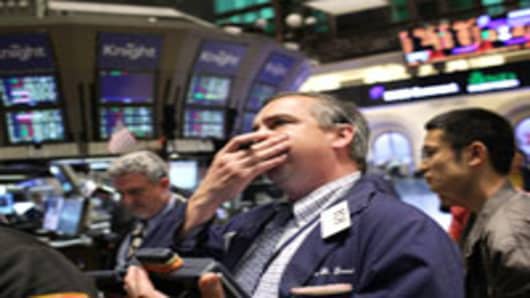Europe is facing a severe debt crisis, unemployment is high and not getting any better, and the housing market stinks—no surprises here, yet markets sell off after virtually every new bit of bad economic news.
The question arises, then, of when the market finally will have priced in all the bad news out there, and stop getting shocked every time there's a new twist and turn.
That development—part of what investors refer to as "capitulation" —is important, because it helps the market form a bottom and signal that stocks could move higher soon.
It's a turn of events, though, that remains elusive.
"Everything is known at this point, unless you have your head in the sand. But it's the contagion issue that everyone is worried about," says Michael Cohn, chief market strategist at Global Arena Investment Advisors in New York. "No one really wants to hear about Greece over and over again. It's annoying and counterproductive. But you need to do something about it."
What the market has done is sell—aggressively.
Stocks lost more than 300 points Friday, when the seemingly benign resignation of Jurgen Stark, German's representative at the European Central Bank, created panic over prospects for a rescue of debt-laden nations such as Greece.
The Dow Jones Industrial Average similarly lost 250 points on Sept. 2, when the U.S. government said a net of zero jobs were created in the past month.
The market also has seen a slew of daily selloffs such as the one Mondaythat were generated by any number of concerns that all seem to have been aired countless times over recent weeks, months, and even years.
"There's obviously a lot of fear and potential signs of capitulation out there," says Ryan Detrick, senior analyst at Schaeffer's Investment Research in Cincinnati. "It doesn't make sense to try to be a hero and pick the bottom. There are underlying issues. We just don't know how bad things are."
As far as Europe goes, the worst-case scenario is Greece defaults on its debt, which in turn sets off other defaults across the euro zone periphery in nations such as Portugal, Italy and Spain. That in turn would trigger losses to banks holding the debt. Those institutions then would have to raise capital, hurting their stock profile and raising alarms about their stability.
Ultimately, the dominos could fall loud enough that the debt crisis would cascade to the U.S. and set off another financial crisis.
Noted banking analyst Dick Bove of Rochdale Securities dismissed such a cataclysmic scenarioover the weekend, though he did predict an inevitable Greek default. But investors seemed unconvinced, continuing to show signs that another crisis similar to what happened in 2008 is in the offing.
"It seems like people are definitely trying to determine where the best place to put their money is and everyone is throwing up their hands wondering where that might be," Detrick of Schaeffer's says. "The dollar's the only thing that's finding a buyer, and in recent times a stronger dollar hasn't been a good sign for the market."
Part of the market's problem is the unwillingness of its analysts and strategists to come to terms with the depth of the problems, says Bob Andres, chief investment strategist at Merion Wealth Partners in Berwyn, Pa.
"Good news is good news and bad news is good news," Andres says to sum up the attitude of market pros trying to push their clients into investing in what he terms the "stock market casino."
"There's such a pattern of behavior. This is not isolated," he says. "This has been going on since this crisis has started."
Investors, though, are growing increasingly skeptical.
The latest Investors Intelligence survey—which polls newsletter editors on their market feelings —saw bullish sentiment slip to 27 percent in August. The CBOE Volatility Index, often used to gauge investor fear, is on track for a three-week closing high.
Corporate buying also has taken a downturn, falling to $9.9 billion over the past two weeks, while insider buying dropped to $30 million for the last five trading days, according to data from TrimTabs.
One positive indication, though, is a modest inflow of $1.3 billion into equity funds for the week ended Sept. 7, a grudging indication that the tide could be turning.
"This worry and fretting is going to create a huge buying opportunity in here," said Global Arena's Cohn. "We're pretty close to it being fully priced in. We may still see lower prices and it may be a thousand points (on the Dow). But the fact is it won't last long."



